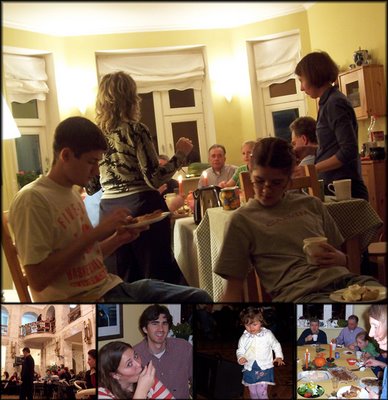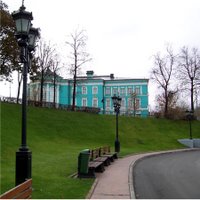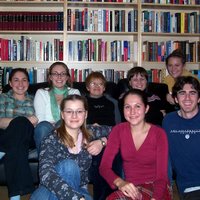(Matt) Events of last Friday, Nov. 25
“Don’t forget” Nelly Alexandrovna (my Russian teacher) told me as she handed me a plain white parcel that she had identified only as “heavy.” I put the box in my bag and told her, “OK, I won’t forget.” I really had no intention of forgetting the box (which was not really all that heavy), but I didn’t realize at the time how direly serious Nelly was in her command. She wasn’t requesting that I not forget, she was warning me in a subtle Russian way that to forget the box would be to open the floodgates of misery and horror for me, her, and a google of other Russians whose happiness and well-being apparently depended on the safe delivery of the white box that was now in my very possession.
I later found out that the box contained about twenty-five individually wrapped chocolate candies. I also later found out the meaning of the word “kashmar”—in Russian, “nightmare.”
We continued on our journey of the day, which was to the “roinok” or market, called “Izmailova,” a notable place for tourists to gather to be “trapped” and sellers to practice the English phrase “Come look; only 500 rubles.” For some reason, Izmailova is at least 20 degrees colder than any other place in the city of Moscow, and my hands would be red and freezing for at least six hours after we eventually left the market.
The first thing that Nelly said to Makinzie and I when we entered the threshold of the market was “don’t speak.” Apparently, our fluent and perfectly-accented Russian capabilities betray our real identities of “rich Americans.” I asked Nelly if we wouldn’t already be identified as foreigners anyway because I was wearing Bert’s blue and bright yellow Columbia jacket and Makinzie was wearing a bright white fleece coat and neon green mittens and stocking cap. Given that the normal Russian outfit is black everything, I was sure that we couldn’t have looked more foreign even if we were wearing our everyday Texan attire of spurs, boots, and oversized ten-gallon hats. But Nelly said our clothing was OK. Our eyes, however, were not OK. Don’t look interested or look around, she explained—look bored and tired.
So we donned the identity of the “typical” Russian customer, disinterested, aloof, apathetic. The change was immediate: suddenly we blended seamlessly into the crowd.
Except that none of the market sellers recognized our obvious Russianness. A woman came running up to us as we passed by her kiosk, babbling a stream of friendly English phrases. “Matryoshki dolls,” she said (these are the nesting dolls); “only fifty rubles! Please look!”
Nelly Alexandrovna bristled. She fired back at the woman a string of harsh sounding Russian phrases, asking her, “What do you think we are, foreigners? Why are you talking to us in English?”

“Oh, I’m so sorry,” said the seller, now speaking rapidly in Russian. “I thought you were Americans. The dolls are only 30 rubles.”
After Nelly gave the woman a brief lecture about the unfairness of spiking the prices for foreigners, she asked the seller, “what makes you think we’re Americans, any way.”
“Well, it’s your clothing,” the woman said. “You look like foreigners.”
“What, me?” Nelly shot back. “What are you saying?”
“No; the young man and the young lady; they’re wearing such bright clothing—they look like Americans.”
So much for our disguise.
The fun continued as we went from stall to stall. The sellers weren’t quite sure how to treat a group where one woman spoke English and the other two customers were apparently mute. They frequently asked Nelly, “do they [pointing to us like we were three-year-olds] speak Russian?” Usually, I would answer “Da” at the exact same moment that Nelly answered “n’yet.” We received more than one look that conveyed the idea that we must have been dragging Nelly along with us at gunpoint. Fortunately, no one was going to raise prices on Nelly, so her presence overrode our obvious failure to perform Rusianness in any competent way.
Well, having finished our experience of the day at the market, we headed back into the Metro station, where we had to part ways. I told Nelly that we were going to go to the university for the rest of the day because we had an event to attend at night. She said that she was going to the train station and then out of town. We exchanged good byes and separated.
The chocolates stayed with me.
At the halfway point on our hour-long journey to RACU, Makinzie and I decided that we would just head home instead of waiting at the university. It seemed like a good decision because we needed to rest and we had already prepared food to eat at home. Along the way, I looked into my bag and saw the chocolates. “Oh no!” I cried, turning to Makinzie. “What should we do?” Well, we considered backtracking the 30 minutes to the last place we had seen Nelly, but then our better judgment kicked in and we decided that she would have already left for the train. So we went home and rested for about three hours and then got out again and made the 1 ½ hour trip back to RACU for the evening’s events.
Imagine our surprise, then, when we arrived at the university and were greeted by about five students who announced, “Nelly Alexandrovna has been looking for you!” Yes; although we had last seen Nelly almost six hours previous, on the entirely opposite side of Moscow, she had taken a two-hour metro ride in the opposite direction from her intended destination in order to find us and obtain her chocolates. She had arrived at RACU almost four hours before us!
Nelly wasn’t very happy when she saw us. I gave her the chocolates and she said, “You told me that you wouldn’t forget!”
“I know,” I told her, “I’m very sorry!”
“You also told me that you were coming straight to RACU!” she exclaimed.
I didn't know how to make my voice more peninent. “I know! I’m sorry; we decided to go home and rest!” I exclaimed, with my best puppy eyes.
By now, a small crowd had gathered to witness the spectacle. I don’t know very many words for “I’m sorry” in Russian, but I used all of them in trying to apologize to Nelly.
After a few more minutes of clarification, Nelly left the university with her chocolates, apparently bound for another two-hour ride on the Metro and then a longer transfer on an electric train to the outer limits of Moscow.
On this Tuesday when I met with Nelly again for my lesson, I tried one more time to make amends for what must have been a disappointing weekend. After I expressed my apologies, I have to confess that I expected the typical American reciprocation, something to the effect of "No, don't worry about it; it was my fault as much as yours."
Instead, Nelly corrected my phrase. I had said, literally, "Please excuse me for what happened last Friday." What I should have said, apparently, was (again, literally translated) "I felt myself ashamed in front of you last Friday."
Так жизнь в Россие ("such is life in Russia")
--Matt













